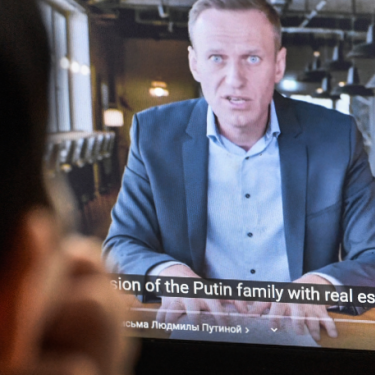Threats against Russian media on eve of pro-Navalny demonstrations

The Russian police are threatening journalists with prosecution in order to deter them from covering tomorrow’s demonstrations in support of jailed opposition leader Alexei Navalny, while online media are liable to be blocked at any moment. Reporters Without Borders (RSF) condemns these serious obstacles to journalism in Russia.
Читать на русском / Read in Russian
As preparations are being made for pro-Navalny demonstrations in 65 Russian cities tomorrow, several journalists have received visits from police warning them of the risk of prosecution if they cover the protests. An order has meanwhile already been issued for websites to be blocked if they post “illegal information” linked to the protests.
“Journalists must not fall victim to agitated officials trying to prevent a protest,” said Jeanne Cavelier, the head of RSF’s Eastern Europe and Central Asia desk. “Covering a demonstration in support of a government opponent who has survived a poisoning attempt is not a crime. We call on the authorities to respect the Russian constitution, to let journalists do their job, and to not surrender to the temptation of a Belarusian-style crackdown.”
Svetlana Prokopyeva, a reporter for Radio Svoboda (the Russian-language service of the US broadcaster Radio Free Europe/Radio Liberty), was one of the first journalists to publicly report on Facebook that she had been subjected to pressure. The independent Union of Russian Journalists and Media Workers (JMWU) has filed a complaint accusing the security forces of acting illegally.
Police also went to Radio Echo of Moscow anchor Aleksandr Plushchev’s home early this morning, upsetting his elderly parents, while freelance journalist Anastasia Lotaryova received a call from the Moscow police asking her to “promise” to stay away from the demonstrations.
Threatened with prosecution over a tweet
Sergei Smirnov, the editor of Mediazona, a leading online source of reporting on police and judicial abuses, received a written warning on the danger of administrative and criminal proceedings after he tweeted about tomorrow’s weather forecast. In an attempt to intimidate him even more, the federal communications agency Roskomnadzor, sent him a letter this afternoon pointing out that he is already being prosecuted for “disseminating fake news about the Covid-19 epidemic.”
The prosecutor-general meanwhile ordered Roskomnadzor to block websites with “illegal information” about tomorrow’s unauthorized protests. Two social media platforms - Vkontakte (the Russian Facebook) and TikTok – have already taken down videos after Roskomnadzor ordered them to prevent “minors from joining the demonstrations.”
At the same time as these blockings and warnings, thousands of fake accounts have reportedly been registered as followers on the Instagram accounts of Navalny and independent media outlets Novaya Gazeta, Dozhd and MBKh Media. The staff of Navalny’s Anti-Corruption Foundation (FBK) fear they could be used to block his accounts in the run-up to the demonstrations.
After several FBK members were arrested, Mediazona quoted court press services as saying journalists will not be allowed to cover their trials. On 19 January, FBK posted an investigative report entitled “Putin’s Palace” about a massive, opulent residence that the president has near the Black Sea. The report has been viewed nearly 60 million times in the three days since its publication.
RSF already registered many cases of journalists being obstructed in connection with Navalny’s return to Russia on 17 January. At least nine reporters and bloggers were prevented from going to Moscow’s Vnukovo airport or were arrested there, while the airport authorities used the Covid-19 pandemic as a pretext for prohibiting any coverage of Navalny disembarking from the plane.
At the last minute, the plane was diverted to another airport to avoid any live coverage of his arrest. Some of the journalists who had flown with him on the same plane were made to wait on the tarmac after disembarking. The next day, media that wanted to cover his trial, which took place in a police station and was supposed to be “public,” were denied entry.
Russia is ranked 149th out of 180 countries in RSF's 2020 World Press Freedom Index.



